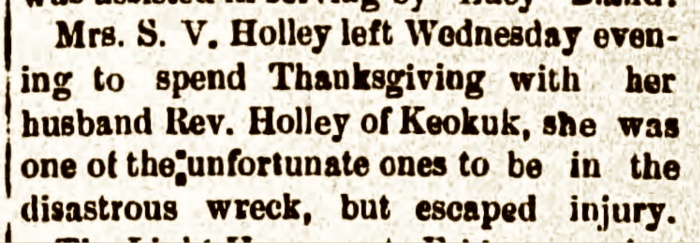This column by Daniel G. Clark about Alexander Clark (1826-1891) first appeared in the Muscatine Journal.
International Women’s Day—a day for celebrating women’s achievements.
Two months before the unanimous vote naming Susan Clark Junior High, a school board member wrote to me: “You might want to create a Wikipedia page for Susan Clark. It’s quite difficult to find information on her online.”
I tried and failed. Several tries have produced the same verdict: there’s already a page for the 1868 Iowa Supreme Court ruling in her name, and that’s enough.
Muscatine Evening Journal, June 24, 1871: “Susie V. Clark is… the first colored person graduated by the High School. She acquitted herself in a manner creditable to herself and her race.”
Chicago Tribune, August 1, 1871: “IOWA. The most successful graduate of the Muscatine High School at its recent graduation was a daughter of Alexander Clark, colored.”
She was Iowa’s first Black high school graduate, too.
Evidently she was an effective speaker and performer. As a young woman, her name appears in the Journal as a reader and singer for Emancipation Days and other occasions.
The Christian Recorder, nationwide paper of the African Methodist Episcopal (A.M.E.) church, reported her December 1877 wedding at Muscatine’s Bethel A.M.E.:
The Rev. Richard Holly, one of the rising men of the Illinois Conference and formerly of Detroit, Mich., led to the altar Miss Susie V. Clark the belle of Muscatine, Iowa, and the second daughter of the honorable and wealthy Alexander Clark who walks the street of that beautiful city and looks up to his three and two story blocks and says, I am monarch of all I survey. … The church was filled to its utmost capacity with the grandest of the city and many from abroad. After the ceremony was performed by the writer [J.B. Dawson], we all repaired to the residence of the bride’s parents. About one hundred persons partook of the ample repast and the presents were varied and valuable. The young couple started the same evening for their future home Champaign, Illinois. May their future be happy and its days many.
Thus, the woman who, as a 13-year-old girl, integrated Iowa public schools—would be known, as an adult, as Mrs. S.V. Holley (less often Holly).
In June 1878 her childhood home was destroyed by fire, likely from arson, soon after her recent prominent wedding, shortly before her brother would become Iowa’s first Black law school graduate. Susan returned, probably with her baby, to care for her mother, Catherine Griffin Clark, who died September 3, 1879.
Rebecca Darnes Clark Howard lived with them at Keokuk. In May 1887, Susan accompanied the body of her twice widowed grandmother to Muscatine for burial.
Later that year they settled in Cedar Rapids, their longest permanent residence. Newspaper reports show them both traveling widely and often. They became, in modern parlance, a “power couple” of the state’s Black community, especially through the church. City directories show Susan worked many years as a dressmaker, perhaps aiding her freedom to take on public roles.
Especially after losing her children.
Sadly, daughter Ida, born in Champaign in 1878, died of spinal meningitis in 1889 before her 11th birthday. Daughter Edith, born in Davenport in 1880, died early in her second year. Son James, born in 1882 in Mt. Pleasant, died soon after birth.
Along with pastoring, Richard accepted church assignments that required living away from Susan weeks or months at a stretch. We see them traveling to and from Cedar Rapids, often separately and often making time to be together.
As a minister’s wife, and evidently on her own merits as well, she was a welcome guest and popular speaker at women’s clubs and conferences. The Iowa State Bystander reports her addressing audiences including Order of the Eastern Star, Heroines of Jericho, JSY Club, One More Effort Club.
Oskaloosa Herald, November 7, 1889: “Hon. Alexander Clark, of Muscatine, was introduced to the [Iowa Woman Suffrage Association] convention and spoke most eloquently for a few minutes.” Did Susan accompany him?
A story from 1898 stands out as illustration of her character. Once while traveling to join her husband, she was a passenger in a train wreck. After listing two dead and many injured and describing the heroics of the crew and first responders, a single sentence in the Cedar Rapids Gazette reports: “Mrs. S.V. Holley, a colored woman, promptly left her perilous position in one of the cars and ministered to the injured.”
A leader of the early 20th century Iowa Federation of Afro-American Women, for several years she chaired its Mothers’ Child Study Committee which encouraged women to train their youngsters in deportment, civic responsibility, and the arts.
After Richard died in 1914, she resided in Chicago with her sister’s daughter. She died of diabetes at age 71 in 1925 and was buried in the family plot at Greenwood Cemetery.
More about Rev. and Mrs. Holley some other time.
Next time: Resting on historic Black property
Top image: Item from the Iowa State Bystander, December 2, 1898. As Mrs. Holley, the former Susan Clark’s name appeared often in Iowa’s Black newspaper.

